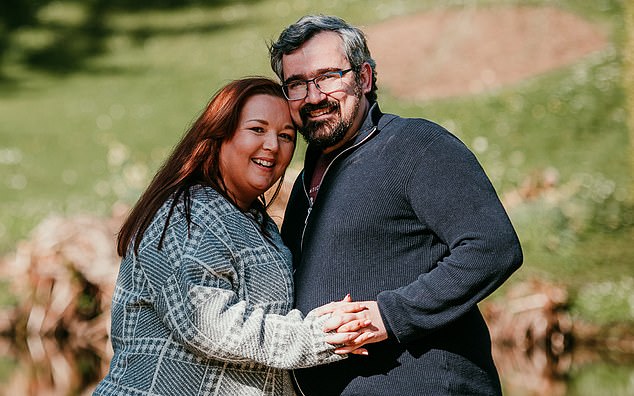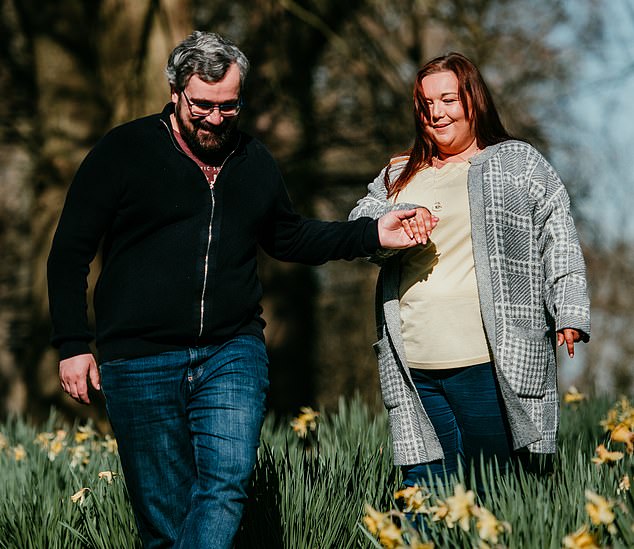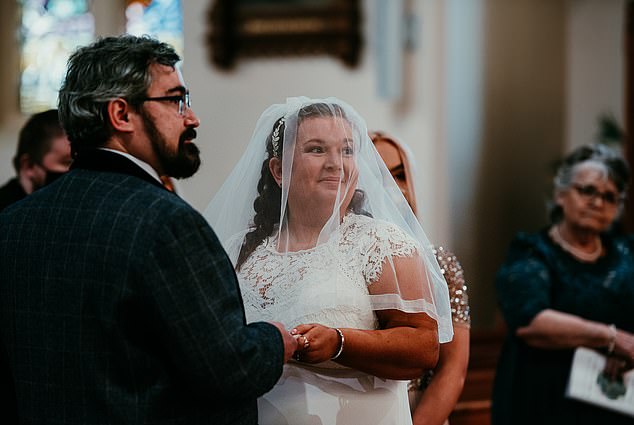Doctors thought my childlike husband was depressed…actually dementia at 38
When 38-year-old Stefan Tankov started behaving strangely in the fall of 2022, doctors thought it was caused by depression and type 2 diabetes.
His wife, Sile, who is now 42 years old, began to notice changes in his personality—he became emotionally withdrawn and wanted her to help him with simple things like riding the bus.
Within six months he was already doing things that were completely out of the ordinary, such as stealing bottles of wine from local shops.
It was only then that he was taken to a specialist who carried out neurological tests which revealed the dreaded diagnosis: juvenile dementia.

After the wedding day of Stefan and Sile Tankov in April 2021 they were in their bubble, but after two years everything started to collapse.

In September 2022, Sile, who is now 42 years old, began to notice changes in Stefan’s personality – he became less emotional and had a ‘child like’ and it was difficult to ride the bus and one.
Sile, a middle school teacher, began to notice Stefan’s personality when he stopped asking him how his day was going and instead asked what food to eat. in the evening.
He was unusually stiff during his evening meal, after which he went straight to sleep.
He remembers her confusion when he asked her to take a bus to visit him at the hospital.
He found it difficult to keep a job and became unusually withdrawn, frequently forgetting simple tasks that his wife asked him to do.
She thought her husband was depressed, so she made an appointment with her doctor to check him out.
The doctor ran tests that revealed she had type 2 diabetes, and concluded that her symptoms were a combination of the disease and mental health issues.
“We thought it might be a concussion but he didn’t get better,” Sile said.
‘When it was time to go to another doctor, he got up and left. I had to bribe him with McDonald’s to come back. It was like dealing with a child.’

It wasn’t until Stefan started stealing wine from their local shop in April 2023 that she took him to hospital where tests revealed that his mental function was “very low”.

Stefan struggled to keep a job and began working as a freelancer, withdrawing and frequently forgetting simple tasks that Sile asked him to do.

The family decided to take Stefan to the hospital where tests revealed that his mental function was very low. Doctors ordered MRI and CT scans with a full psychiatric report
Six months later, in April 2023, Sile saw workers at a local grocery store go into ‘a bit of a frenzy’. Her husband came to her and informed her that she was banned from business.
The shop owner had caught Stefan several times trying to steal bottles of wine.
The family decided to take Stefan to the hospital where tests revealed that his mental function was very low. Doctors ordered MRI and CT scans with a full psychiatric report.
After the hospital visit Sile took care of him at home for the next four weeks.
He said: ‘One morning I found him about to put his hands on the hob, which was bright red, to see if it was warm. He would wander around, walk in front of cars and look at people. We stopped going out. He started smoking and couldn’t control himself.
‘I don’t know how I coped. I was lucky that I took time off from work, but I needed to go back or we would have no money,’ he added.
Sile took her husband back to hospital where he underwent CT and MRI scans and a bone marrow biopsy before being diagnosed with frontotemporal dementia – a rare form of the disease that causes behavioral and speech problems. .
‘I was very surprised…we were hoping to have a family,’ Sile said.

Dementia is the UK’s biggest killer, affecting around a million people in the country

The charity estimates that more than 70,000 people are living with early onset dementia, where symptoms start before the age of 65.
Dementia is the UK’s biggest killer, affecting around a million people in the country.
It is estimated that more than 70,000 people are living with early onset dementia, where symptoms begin before the age of 65.
It can cause many symptoms, especially in the early stages.
Young-onset dementia is also more likely to be genetic and in most cases young people with dementia do not have serious or long-term health conditions. .
Unable to return home, Stefan stayed in a care home before being sent back to hospital, where he stayed for 11 months, and Sile was able to arrange hourly visits.
Sile found it ‘difficult’ as he never got to see his room and had to be constantly on call from social workers, counsellors, psychologists and nurses.
Stefan finally moved to a new care home in July, but things are still difficult for Sile.
‘You don’t expect to find yourself shopping for soft toys for newborns because your 40-year-old husband has started chewing on the teddy bears he needs to sleep and you’re worried he might I choked,’ he said.
He said the doctors told him in May that if he was still here in six months to a year, he would be fine.
Sile believes that the tragedy was isolation, while others visit their parents and grandparents in the care home, she visited her husband.
But she has received support from family, friends, colleagues and neighbors as well as the Alzheimer’s Society, Admiral Nurses and eight weeks of counseling through Rare Dementia Support.
‘He is happy in the family and I like to be there with him, even if it means getting into bed next to him and hugging him. There are small signs that matter, like him singing along to a song my brother wrote, or squeezing my hand. If I say I love you, he’ll say, “I love you so much,” he said.
‘Looking back, those good times are the things I want to have.’
Alzheimer’s Society is asking people to share their stories at alzheimers.org.uk/stories
#Doctors #thought #childlike #husband #depressed…actually #dementia
